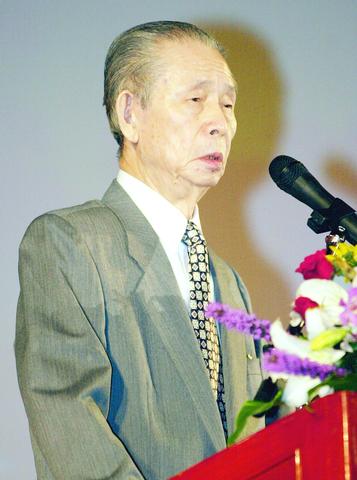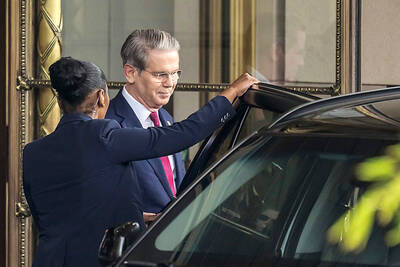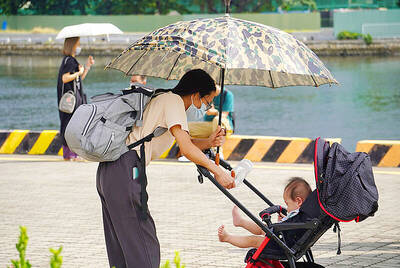Formosa Plastics Group (台塑集團) chairman Wang Yung-ching (王永慶) is motivated by simple desires: the advancement and enrichment of his business empire.
Wang's call this week for the government to accept Beijing's "one China" principle, thereby presumably appeasing Beijing and hopefully paving the way for an easing of bans on direct cross-strait economic ties, could only have been driven by such motivations.

TAIPEI TIMES FILE PHOTO
Long the most vocal proponent of easing the ban on direct investment in China, Wang has been slammed by DPP lawmakers and pro-independence media for allegedly selling out Taiwan for his own gain.
Wang has previously defended himself from such claims by pointing out that his group's three main business groups -- Nanya Plastics (
But with billions already invested in China and with millions more slated for investments in petrochemical complexes, biotech ventures and hospitals, Wang has much to gain from more intimate ties between Taipei and Beijing.
Nevertheless, in the past Wang has used the so-called "China card" not to broker closer economic ties but to further his own interests at home.
In 1989 Wang signed a deal to invest in a US$6-billion petrochemical complex in Haicang, Fujian Province. The scale of the project, which would have included an oil refinery and two naphtha-cracker plants, and the sheer audacity of the move stunned the government, which feared other large corporations would follow his lead.
By 1992 the government had managed to persuade Wang to drop the plan, but not until he had milked permission from the government to buy land in Mailiao -- for reportedly one-third of the going price -- upon which he built his massive naphtha cracker complex.
Additionally he was granted a five-year tax holiday, according to reports.
"Wang always does things based on his own interests," said Wang To-far (
"He gives the government pressure and gets some advantage from it," he said.
Although previously Wang has also simply defied the restrictions, taking a 60 percent stake in the construction of the US$3-billion Hwa Yang power plant located in Zhangzhou, Fujian Province.
Previously invited to air his views on the nation's economic problems and investment restrictions personally to President Chen Shui-bian (
By making the "one-China" remark, Wang seemed to be flouting his indifference to the government's current review of his planned US$13 billion petrochemical project in Ningbo, Fujian Province. Just a day later it hit a bureaucratic pothole when the Mainland Affairs Council (陸委會) asked for more detailed information about the planned investment before it would approve the project although the Council denied the move was connected with Wang's "one-China" statement.
Indeed Wang's remarks this week may have been targeted at the authorities in Beijing, who have welcomed Wang's investment dollars and reportedly offered him generous investment incentives.
Wang was reportedly granted an extra 2,000 hectares of land by the Chinese government for his Ningbo project.
Another project in the works is plan to expand the Chang Gung Memorial Hosptial into China.
Wang founded and operates the hospital which received the nod late last year from Chinese authorities to establish branches in Xiamen, Fuzhou and Beijing. Formosa Plastics Group now also has at least 15 other major investment projects in China ranging in value between US$1.8 million and US$100 million.
Fueling rumors that Wang is increasingly bowing to Beijing was his pull-out in early May from backing the pro-independence Taiwan Daily newspaper.
According to Wang, the end of his backing of the paper, which he had supported since 1996, was due to the excessive financial strain the paper was having on his wallet which is believed to be around NT$3.5 billion lighter due to the paper.
In examining Wang's choices throughout the course of his 84-year life, it becomes apparent that he is not one to hold on long to a poor investment; a trait that has paid off as he is now ranked among the world's 500 wealthiest people with his personal assets valued at US$2.7 billion by Forbes magazine.
Born in 1917 into a poor family of a tea grower in Taipei County, Wang first found fortune in the lumber industry beginning in 1943.
After initial success due to post-war reconstruction, Wang had hit supply problems due to shortages of timber and by 1954 had ditched lumber and moved into plastics.
Wang formed Formosa Plastics Corporation in March, 1954, with US$500,000 of his own capital and US$670,000 of US aid. Though the company's main product was PVC, Wang admitted that he knew nothing about the petrochemical industry.
But his initial shortcomings in the industry were balanced by his aggressive business tactics.
Facing almost zero sales of his product due to a lack of confidence among his downstream plastics processors, Wang simply established his own downstream company -- Nan Ya Plastics -- which processed and promoted Formosa's products.
Matching his aggressive intensity in the marketplace is a tight, institutionalized management philosophy that has earned him the nickname "god of business."
This boils down to simply working harder, longer and more efficiently than the competition. This is instilled and maintained throughout his workforce via close scrutiny of all the details of regular meetings between employees and senior management, ie, Wang himself.

Taiwanese Olympic badminton men’s doubles gold medalist Wang Chi-lin (王齊麟) and his new partner, Chiu Hsiang-chieh (邱相榤), clinched the men’s doubles title at the Yonex Taipei Open yesterday, becoming the second Taiwanese team to win a title in the tournament. Ranked 19th in the world, the Taiwanese duo defeated Kang Min-hyuk and Ki Dong-ju of South Korea 21-18, 21-15 in a pulsating 43-minute final to clinch their first doubles title after teaming up last year. Wang, the men’s doubles gold medalist at the 2020 and 2024 Olympics, partnered with Chiu in August last year after the retirement of his teammate Lee Yang

FALSE DOCUMENTS? Actor William Liao said he was ‘voluntarily cooperating’ with police after a suspect was accused of helping to produce false medical certificates Police yesterday questioned at least six entertainers amid allegations of evasion of compulsory military service, with Lee Chuan (李銓), a member of boy band Choc7 (超克7), and actor Daniel Chen (陳大天) among those summoned. The New Taipei City District Prosecutors’ Office in January launched an investigation into a group that was allegedly helping men dodge compulsory military service using falsified medical documents. Actor Darren Wang (王大陸) has been accused of being one of the group’s clients. As the investigation expanded, investigators at New Taipei City’s Yonghe Precinct said that other entertainers commissioned the group to obtain false documents. The main suspect, a man surnamed

US Secretary of the Treasury Scott Bessent and US Trade Representative Jamieson Greer began talks with high-ranking Chinese officials in Switzerland yesterday aiming to de-escalate a dispute that threatens to cut off trade between the world’s two biggest economies and damage the global economy. The US delegation has begun meetings in Geneva with a Chinese delegation led by Chinese Vice Premier He Lifeng (何立峰), Xinhua News Agency said. Diplomats from both sides also confirmed that the talks have begun, but spoke anonymously and the exact location of the talks was not made public. Prospects for a major breakthrough appear dim, but there is

The number of births in Taiwan fell to an all-time monthly low last month, while the population declined for the 16th consecutive month, Ministry of the Interior data released on Friday showed. The number of newborns totaled 8,684, which is 704 births fewer than in March and the lowest monthly figure on record, the ministry said. That is equivalent to roughly one baby born every five minutes and an annual crude birthrate of 4.52 per 1,000 people, the ministry added. Meanwhile, 17,205 deaths were recorded, resulting in a natural population decrease of 8,521, the data showed. More people are also leaving Taiwan, with net